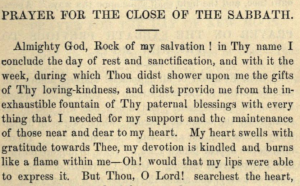| Contribute a translation | Source (English) |
|---|---|
Almighty God, Rock of my salvation! in Thy name I conclude the day of rest and sanctification, and with it the week, during which Thou didst shower upon me the gifts of Thy loving-kindness, and didst provide me from the inexhaustible fountain of Thy paternal blessings with every thing that I needed for my support and the maintenance of those near and dear to my heart. | |
My heart swells with gratitude towards Thee, my devotion is kindled and burns like a flame within me — Oh! would that my lips were able to express it. But Thou, O Lord! searchest the heart, examinest the thoughts of man, and acceptest the will for the deed, and even our aspiration towards virtue is accepted and counted by Thee for its practice. Yet, without Thine aid we cannot find the right path, nor fulfill our duties. | |
Therefore, God! I pray unto Thee, at the beginning of a new week, to which Thou hast preserved our lives, to open unto us the gates of understanding, of knowledge, and of enlightenment, that we may shun evil and sin, all that is immoral useless and reprehensible, and enter, pure and sanctified, into the gates of virtue, piety and chastity! Open unto us the gates of contentment and tranquillity of the heart, and concord and peace, of universal unity and brotherly love, that we may envy no one, and no one may envy us. Open unto us the gates of blessing, of prosperity and happiness, that all the works of our hands may be crowned with success. Open unto us the gates of joy and delight, of acceptance and fulfillment, that we may behold the realization of the gladsome promise which Thou hast given unto the pious and righteous: “And the Lord shall give unto thee according to the desire of thy heart and prosper all thy designs. Thou shalt also decree a thing, and it shall be established unto thee, and the light shall shine upon thy ways.” (Job 22:28) | |
Amen. |
“Prayer for the Close of the Sabbath” is one of thirty prayers appearing in Rabbi Moritz Mayer’s collection of tehinot, Hours of Devotion (1866), of uncertain provenance and which he may have written. –Aharon Varady
Source(s)


“Prayer for the Close of the Sabbath, by Rabbi Moritz Mayer (1866)” is shared through the Open Siddur Project with a Creative Commons Public Domain Dedication 1.0 Universal license.










Leave a Reply